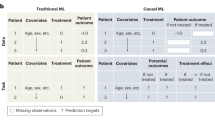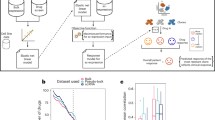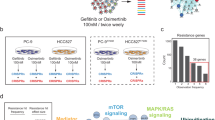Abstract
The discovery of biomarkers that provide information on drug efficacy is recognized as essential for successful and cost-effective treatment of cancer. However, biomarker discovery is difficult, and requires multiple independent studies to identify a target that serves as a suitable predictor of efficacy and to ensure appropriate biomarker validation. Clinical trials that are performed, sometimes sequentially, in Europe, the USA or Asia, are often similar in their design, in part owing to regulatory, marketing, or safety considerations. We believe some of these trials offer additional unique opportunities for biomarker discovery or validation. There are multiple hurdles to overcome, such as homogenous tissue acquisition and analysis, defining and aligning biomarker hypotheses across trials, and the need to adapt sample sizes and trial designs. Nevertheless, we believe that a collaborative engagement of the academic, regulatory and pharmaceutical community can go a long way in addressing these issues and producing more-rapid results in the field of personalized medicine. In this Perspectives, we describe our views on the current fragmented approach to biomarker discovery and validation in relevant trials run within our own regions—that is, Europe, China, and the USA—and hope this article serves as a base for further reflection.
This is a preview of subscription content, access via your institution
Access options
Subscribe to this journal
Receive 12 print issues and online access
$209.00 per year
only $17.42 per issue
Buy this article
- Purchase on Springer Link
- Instant access to full article PDF
Prices may be subject to local taxes which are calculated during checkout

Similar content being viewed by others
Change history
28 May 2015
In the online version of this article, Lin Shen was incorrectly spelt Li Shen. This error has now been corrected for the HTML and PDF versions of the article published online.
References
WHO International Agency for Research on Cancer. GLOBOCAN 2012: Estimated Cancer Incidence, Mortality and Prevalence Worldwide in 2012 [online], (2012).
Chen, Q. et al. An analysis of incidence and mortality of colorectal cancer in China, 2003–2007. China Cancer 21, 179–182 (2012).
Wang, N., Sun, T.-T. & Zeng, R.-S. An analysis of incidence and mortality of colorectal cancer in China, 2009. China Cancer 22, 515–520 (2013).
Schmoll, H. J. et al. ESMO Consensus Guidelines for management of patients with colon and rectal cancer. a personalized approach to clinical decision making. Ann. Oncol. 23, 2479–2516 (2012).
National Comprehensive Cancer Network. NCCN Guidelines Colon Cancer Version 3.2013 [online], (2013).
Stintzing, S., Stremitzer, S., Sebio, A. & Lenz, H. J. Predictive and prognostic markers in the treatment of metastatic colorectal cancer (mCRC): personalized medicine at work. Hematol. Oncol. Clin. North Am. 29, 43–60 (2015).
Roth, A. D. et al. Integrated analysis of molecular and clinical prognostic factors in stage II/III colon cancer. J. Natl Cancer Inst. 104, 1635–1646 (2012).
Douillard, J. Y. et al. Randomized, phase III trial of panitumumab with infusional fluorouracil, leucovorin, and oxaliplatin (FOLFOX4) versus FOLFOX4 alone as first-line treatment in patients with previously untreated metastatic colorectal cancer: the PRIME study. J. Clin. Oncol. 28, 4697–4705 (2010).
Douillard, J. Y. et al. Panitumumab–FOLFOX4 treatment and RAS mutations in colorectal cancer. N. Engl. J. Med. 369, 1023–1034 (2013).
Van Cutsem, E. et al. Fluorouracil, leucovorin, and irinotecan plus cetuximab treatment and RAS mutations in colorectal cancer. J. Clin. Oncol. 33, 692–700 (2015).
Bokemeyer, C. et al. Efficacy according to biomarker status of cetuximab plus FOLFOX-4 as first-line treatment for metastatic colorectal cancer: the OPUS study. Ann. Oncol. 22, 1535–1546 (2011).
Tejpar, S. et al. Effect of KRAS and NRAS mutations on treatment outcomes in patients with metastatic colorectal cancer (mCRC) treated first-line with cetuximab plus FOLFOX4: new results from the OPUS study [abstract]. J. Clin. Oncol. 32 (Suppl. 3), LBA444 (2014).
Amado, R. G. et al. Wild-type KRAS is required for panitumumab efficacy in patients with metastatic colorectal cancer. J. Clin. Oncol. 26, 1626–1634 (2008).
Karapetis, C. et al. K-ras mutations and benefit from cetuximab in advanced colorectal cancer. N. Engl. J. Med. 359, 1757–1765 (2008).
Heinemann, V. et al. FOLFIRI plus cetuximab versus FOLFIRI plus bevacizumab as first-line treatment for patients with metastatic colorectal cancer (FIRE-3): a randomised, open-label, phase 3 trial. Lancet Oncol. 15, 1065–1075 (2014).
Van Cutsem, E. et al. Addition of aflibercept to fluorouracil, leucovorin, and irinotecan improves survival in a phase III randomized trial in patients with metastatic colorectal cancer previously treated with an oxaliplatin-based regimen. J. Clin. Oncol. 30, 3499–3506 (2012).
US National Library of Medicine. ClinicalTrials.gov [online], (2012).
US National Library of Medicine. ClinicalTrials.gov [online], (2012).
US National Library of Medicine. ClinicalTrials.gov [online], (2015).
Grothey, A. et al. Regorafenib monotherapy for previously treated metastatic colorectal cancer (CORRECT): an international, multicentre, randomised, placebo-controlled, phase 3 trial. Lancet 381, 303–312 (2013).
European Medicines Agency. European public assessment report. Stivarga: summary of product characteristics [online], (2013).
US National Library of Medicine. ClinicalTrials.gov [online], (2015).
World Medical Association. WMA Declaration of Helsinki - Ethical Principles for Medical Research Involving Human Subjects [online], (2013).
International Conference on Harmonization. Guideline for Good Clinical Practice E6(R1) [online], (1996).
Dienstmann, R., Salazar, R. & Tabernero, J. The evolution of our molecular understanding of colorectal cancer: what we are doing now, what the future holds, and how tumor profiling is just the beginning. Am. Soc. Clin. Oncol. Educ. Book 2014, 91–99 (2014).
Van Cutsem, E. et al. Randomized phase III trial comparing biweekly infusional fluorouracil/leucovorin alone or with irinotecan in the adjuvant treatment of stage III colon cancer: PETACC-3. J. Clin. Oncol. 27, 3117–3125 (2009).
Bosman, F. T. et al. Tissue biomarker development in a multicentre trial context: a feasibility study on the PETACC3 stage II and III colon cancer adjuvant treatment trial. Clin. Cancer Res. 15, 5528–5533 (2009).
Budinska, E. et al. Gene expression patterns unveil a new level of molecular heterogeneity in colorectal cancer. J. Pathol. 231, 63–76 (2013).
Bertagnolli, M. M. et al. Microsatellite instability predicts improved response to adjuvant therapy with irinotecan, fluorouracil, and leucovorin in stage III colon cancer: Cancer and Leukemia Group B Protocol 89803. J. Clin. Oncol. 27, 1814–1821 (2009).
Bertagnolli, M. M. et al. p27Kip1 in stage III colon cancer: implications for outcome following adjuvant chemotherapy in Cancer and Leukemia Group B Protocol 89803. Clin. Cancer Res. 15, 2116–2122 (2009).
Simon, R. M., Paik, S. & Hayes, D. F. Use of archived specimens in evaluation of prognostic and predictive biomarkers. J. Natl Cancer Inst. 101, 1446–1452 (2009).
McShane, L. M. et al. REporting recommendations for tumor MARKer prognostic studies (REMARK). Nat. Clin. Pract. Oncol. 2, 416–422 (2005).
Alonzo, T. A. Standards for reporting prognostic tumor marker studies. J. Clin. Oncol. 23, 9053–9054 (2005).
US National Library of Medicine. ClinicalTrials.gov [online], (2015).
US National Library of Medicine. ClinicalTrials.gov [online], (2013).
CFDA. China Food and Drug Administration [online], (2015).
Bang, Y. J. et al. Trastuzumab in combination with chemotherapy versus chemotherapy alone for treatment of HER2-positive advanced gastric or gastro-oesophageal junction cancer (ToGA): a phase 3, open-label, randomised controlled trial. Lancet 376, 687–697 (2010).
Ohtsu, A. et al. Bevacizumab in combination with chemotherapy as first-line therapy in advanced gastric cancer: a randomized, double-blind, placebo-controlled phase III study. J. Clin. Oncol. 29, 3968–3976 (2011).
The State Council, the People's Republic of China. Colorectal Cancer Treatment Guidelines version 2010 [online], (2010).
CGOG. Chinese Gastrointestinal Oncology Group [online], (2015).
US National Library of Medicine. ClinicalTrials.gov [online], (2015).
US National Library of Medicine. ClinicalTrials.gov [online], (2009).
US National Library of Medicine. ClinicalTrials.gov [online], (2013).
Metzger-Filho, O. et al. Analysis of regional timelines to set up a global phase III clinical trial in breast cancer: the adjuvant lapatinib and/or trastuzumab treatment optimization experience. Oncologist 18, 134–140 (2013).
US National Library of Medicine. ClinicalTrials.gov [online], (2013).
Maemondo, M. et al. Gefitinib or chemotherapy for non-small-cell lung cancer with mutated EGFR. N. Engl. J. Med. 362, 2380–2388 (2010).
Mok, T. S. et al. Gefitinib or carboplatin-paclitaxel in pulmonary adenocarcinoma. N. Engl. J. Med. 361, 947–957 (2009).
US National Library of Medicine. ClinicalTrials.gov [online], (2013).
US National Library of Medicine. ClinicalTrials.gov [online], (2013).
US National Library of Medicine. ClinicalTrials.gov [online], (2012).
US National Library of Medicine. ClinicalTrials.gov [online], (2013).
Van Cutsem, E. et al. Bevacizumab in combination with chemotherapy as first-line therapy in advanced gastric cancer: a biomarker evaluation from the AVAGAST randomized phase III trial. J. Clin. Oncol. 30, 2119–2127 (2012).
Shen, L. et al. Bevacizumab plus capecitabine and cisplatin in Chinese patients with inoperable locally advanced or metastatic gastric or gastroesophageal junction cancer: randomized, double-blind, phase III study (AVATAR study). Gastric Cancer 18, 168–176 (2015).
China Food and Drug Administration. Enforcement Regulations on Clinical Use of Genetic Sequencing Products and Technology [online], (2014).
Ye, L. C. et al. Randomized controlled trial of cetuximab plus chemotherapy for patients with KRAS wild-type unresectable colorectal liver-limited metastases. J. Clin. Oncol. 31, 1931–1938 (2013).
US National Library of Medicine. ClinicalTrials.gov [online], (2014).
BGI. Beijing Genomics Institute [online], (2015).
Song, Y. et al. Identification of genomic alterations in esophageal squamous cell cancer. Nature 509, 91–95 (2014).
Ocana, A., Amir, E., Vera-Badillo, F., Seruga, B. & Tannock, I. F. Phase III trials of targeted anticancer therapies: redesigning the concept. Clin. Cancer Res. 19, 4931–4940 (2013).
Day, F. L. et al. PIK3CA and PTEN gene and exon mutation-specific clinicopathologic and molecular associations in colorectal cancer. Clin. Cancer Res. 19, 3285–3296 (2013).
Sinicrope, F. A. et al. Molecular markers identify subtypes of stage III colon cancer associated with patient outcomes. Gastroenterology 148, 88–99 (2015).
American Joint Committee on Cancer. 8th Edition Publication Date Announced [online].
US National Library of Medicine. ClinicalTrials.gov [online], (2014).
US National Library of Medicine. ClinicalTrials.gov [online], (2014).
Author information
Authors and Affiliations
Contributions
All authors researched the data for the article, contributed substantially to discussion of content, wrote the article, and reviewed and edited the manuscript before submission.
Corresponding authors
Ethics declarations
Competing interests
S.T. has received research funding from Bayer and Sanofi. The other authors declare no competing interests.
PowerPoint slides
Rights and permissions
About this article
Cite this article
Tejpar, S., Shen, L., Wang, X. et al. Integrating biomarkers in colorectal cancer trials in the West and China. Nat Rev Clin Oncol 12, 553–560 (2015). https://doi.org/10.1038/nrclinonc.2015.88
Published:
Issue Date:
DOI: https://doi.org/10.1038/nrclinonc.2015.88



